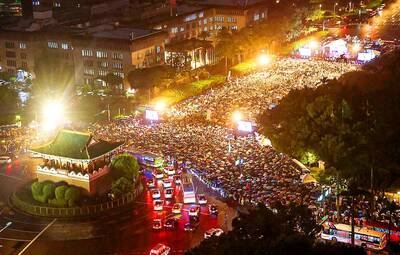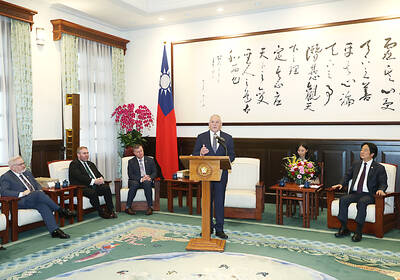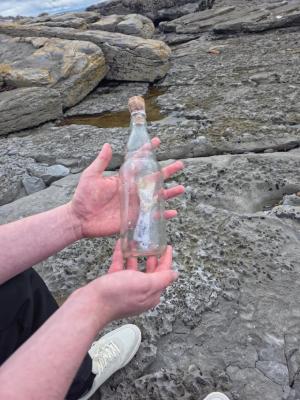Taiwan’s antiquated rules for those infected with HIV have led between 30 and 50 HIV-infected foreigners in Taiwan to avoid medical treatment or remain underground following diagnosis.
“The restrictions leave them living in the dark. They can’t go to hospital for medication to control their illness until the HIV infection gets worse or turns into full-blown AIDS. How can we forgive ourselves?” said Paul Hsu (徐森杰), secretary-general of the Taiwan Lourdes Association, referring to the Statute For Human Immunodeficiency Virus Prevention and Control, and Safeguarding the Rights of the Infected (人類免疫缺乏病毒傳染防治及感染者權益保障條例) and the Immigration Act (入出國及移民法).
Under these laws, foreign nationals with HIV are required to leave the country immediately. Those infected by their native spouse or while receiving medical care in Taiwan can petition for exemption.
The regulations stipulate that the Department of Health (DOH) “may” require aliens, citizens of China, Hong Kong or Macau who have stayed in the country for more than three months to submit an HIV antibody test report taken within the last three months.
If the test is positive, the DOH will notify related agencies to revoke their visa or residence permit, and order them to leave the country.
Hsu said that the rationale behind the rules stem from two ways of thinking: “The government considers the country’s medical resources finite, while it is also worried that more nationals will be infected if HIV-positive aliens stay in the country.”
“For HIV-infected foreigners who opt to go underground to avoid deportation, could it be that we just sit back and appear unconcerned with their medical needs?” Hsu said.
Hsu called on the government to open its borders to HIV-infected individuals regardless of nationality to bring the country’s rules in line with internationally recognized norms.
“AIDS is an illness and not a crime, and it simply does not constitute sufficient reason to be denied entry or be forced to leave a country,” he said.
In a June 2008 report advocating non-discrimination in the freedom of movement of people living with HIV by UNAIDS, the Joint UN Program on HIV/AIDS, UN Secretary-General Ban Ki-Moon called for a change in such restrictions.
As of May last year, some 59 countries, territories and areas denied entry, visits or residence to HIV-positive people, the report said.
UNAIDS said that such restrictions are “unnecessary, discriminatory and obsolete.”
Last month, the US and South Korea both eliminated travel bans for people with HIV.
Australia, which has strict health requirements for people applying for permanent residency, early this month loosened health restrictions allowing migrant workers with chronic conditions to enter Australia, including those with HIV/AIDS.
“Actually a number of countries do not have any problems accepting HIV-positive people in their countries,” said Ivory Lin (林宜慧), secretary-general of the Persons with HIV/AIDS Rights Advocacy Association of Taiwan, citing the examples of Japan, France, Germany, the UK and Italy.
Having been approached by a number of foreigners for help since the association’s establishment in 1997, Lin said that most people are not aware of the rules until they encounter a problem.
“Facing deportation makes a big change in people’s lives,” Lin said, recalling a Japanese man who told her that he couldn’t understand why Taiwan has such rules.
“He was in Taiwan for work and he received a letter asking him to leave the country before a certain date and time following his positive screening result. He asked me if being infected was such a terrible thing or if he had done anything wrong,” Lin said.
Lin said an HIV-infected New Zealander also wrote her an indignant letter before leaving Taiwan, in which he said he had been a law-abiding person and had filed taxes just as others during his six years in the country.
“He asked me if he had committed an illegal act and why he was being deported. I replied by offering an apology on behalf of [my] government. After reading his letter, I felt that the only thing I could do was apologize,” Lin said.
What is more unfathomable is the administrative ordinance that exempts foreigners in certain professions from submitting HIV test reports.
Foreigners granted exemptions in the Regulations Governing Management of the Health Examination of Employed Aliens (外國人健康檢查管理辦法) include technical personnel, overseas compatriots, executives of foreign-funded businesses, college teachers, language teachers in junior and senior high schools, athletes, coaches, religious personnel and art performers, among others.
“Unlike them, [blue-collar] immigrant workers and foreign spouses, a majority of whom are brides from Southeast Asian countries, are required to present proof of HIV-negative status. The workers are required to undergo HIV testing every six months,” Lin said.
Testing for HIV is a two-step process, but the government could decide to deport a migrant worker if he or she tests positive for HIV in the first stage, Lin said, adding that there were cases of migrant workers wronged by the practice who had no one to help them appeal.
Chiu Shu-mei (邱淑美), secretary-general of the Garden of Mercy Foundation, said that travel bans do nothing to reduce the risks of HIV infection, nor do they help AIDS prevention.
“I hope that the lifting of HIV/AIDS travel bans in the US and South Korea will drive the government to rethink its restrictions,” Chiu said, adding there is no way that the restrictions prevent the spread of the disease.
“Although the government can keep some HIV-infected people out of the country, it will never be able to prohibit its people from traveling overseas,” Chiu said.
As for the government’s concern that lifting the bans would lead to an undue financial burden on the country — one of few countries in the world where the government provides free medication for AIDS patients — Chiu said that the government could just as well cancel the free services for foreigners in some cases.
“The government’s two main concerns do not constitute sufficient reasons for keeping the bans,” Chiu said, adding that equipping people with knowledge about the illness and adopting a reporting system to track the spread of HIV-AIDS would do more to further the government’s aims.

FINAL COUNTDOWN: About 50,000 attended a pro-recall rally yesterday, while the KMT and the TPP plan to rally against the recall votes today Democracy activists, together with arts and education representatives, yesterday organized a motorcade, while thousands gathered on Ketagalan Boulevard in Taipei in the evening in support of tomorrow’s recall votes. Recall votes for 24 Chinese Nationalist Party (KMT) lawmakers and suspended Hsinchu City mayor Ann Kao (高虹安) are to be held tomorrow, while recall votes for seven other KMT lawmakers are scheduled for Aug. 23. The afternoon motorcade was led by the Spring Breeze Culture and Arts Foundation, the Tyzen Hsiao Foundation and the Friends of Lee Teng-hui Association, and was joined by delegates from the Taiwan Statebuilding Party and the Taiwan Solidarity

‘NON-RED’: Taiwan and Ireland should work together to foster a values-driven, democratic economic system, leveraging their complementary industries, Lai said President William Lai (賴清德) yesterday expressed hopes for closer ties between Taiwan and Ireland, and that both countries could collaborate to create a values-driven, democracy-centered economic system. He made the remarks while meeting with an Irish cross-party parliamentary delegation visiting Taiwan. The delegation, led by John McGuinness, deputy speaker of the Irish house of representatives, known as the Dail, includes Irish lawmakers Malcolm Byrne, Barry Ward, Ken O’Flynn and Teresa Costello. McGuinness, who chairs the Ireland-Taiwan Parliamentary Friendship Association, is a friend of Taiwan, and under his leadership, the association’s influence has grown over the past few years, Lai said. Ireland is

Instead of threatening tariffs on Taiwan-made chips, the US should try to reinforce cooperation with Taiwan on semiconductor development to take on challenges from the People’s Republic of China (PRC), a Taiwanese think tank said. The administration of US President Donald Trump has threatened to impose across-the-board import duties of 32 percent on Taiwan-made goods and levy a separate tariff on semiconductors, which Taiwan is hoping to avoid. The Research Institute for Democracy, Society, and Emerging Technology (DSET), a National Science and Technology Council think tank, said that US efforts should focus on containing China’s semiconductor rise rather than impairing Taiwan. “Without

An SOS message in a bottle has been found in Ireland that is believed to have come from the Taiwanese captain of fishing vessel Yong Yu Sing No. 18 (永裕興18號), who has been missing without a trace for over four years, along with nine Indonesian crew members. The vessel, registered to Suao (蘇澳), went missing near Hawaii on Dec. 30, 2020. The ship has since been recovered, but the 10 crew members have never been found. The captain, surnamed Lee (李), is believed to have signed the note with his name. A post appeared on Reddit on Tuesday after a man